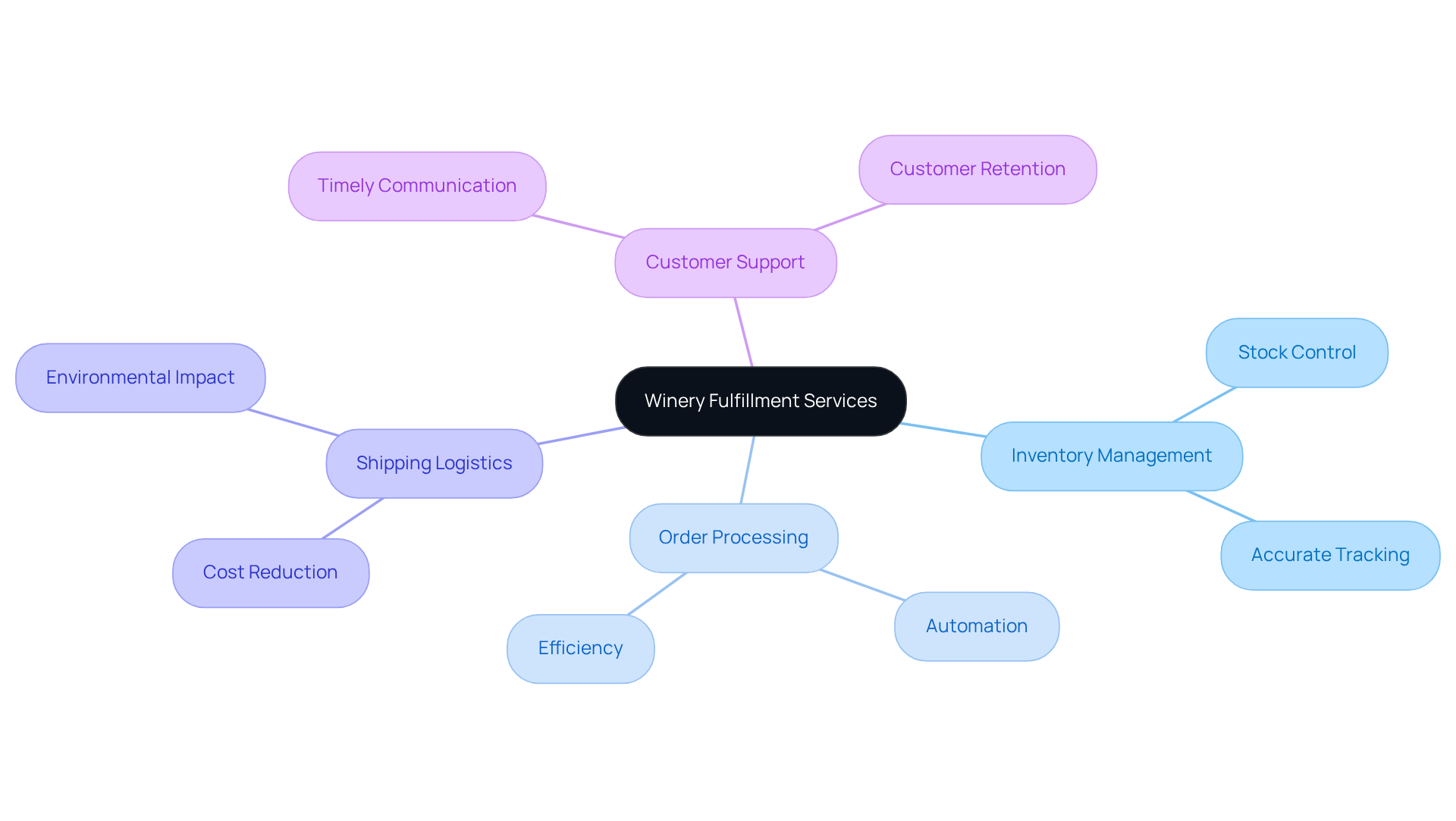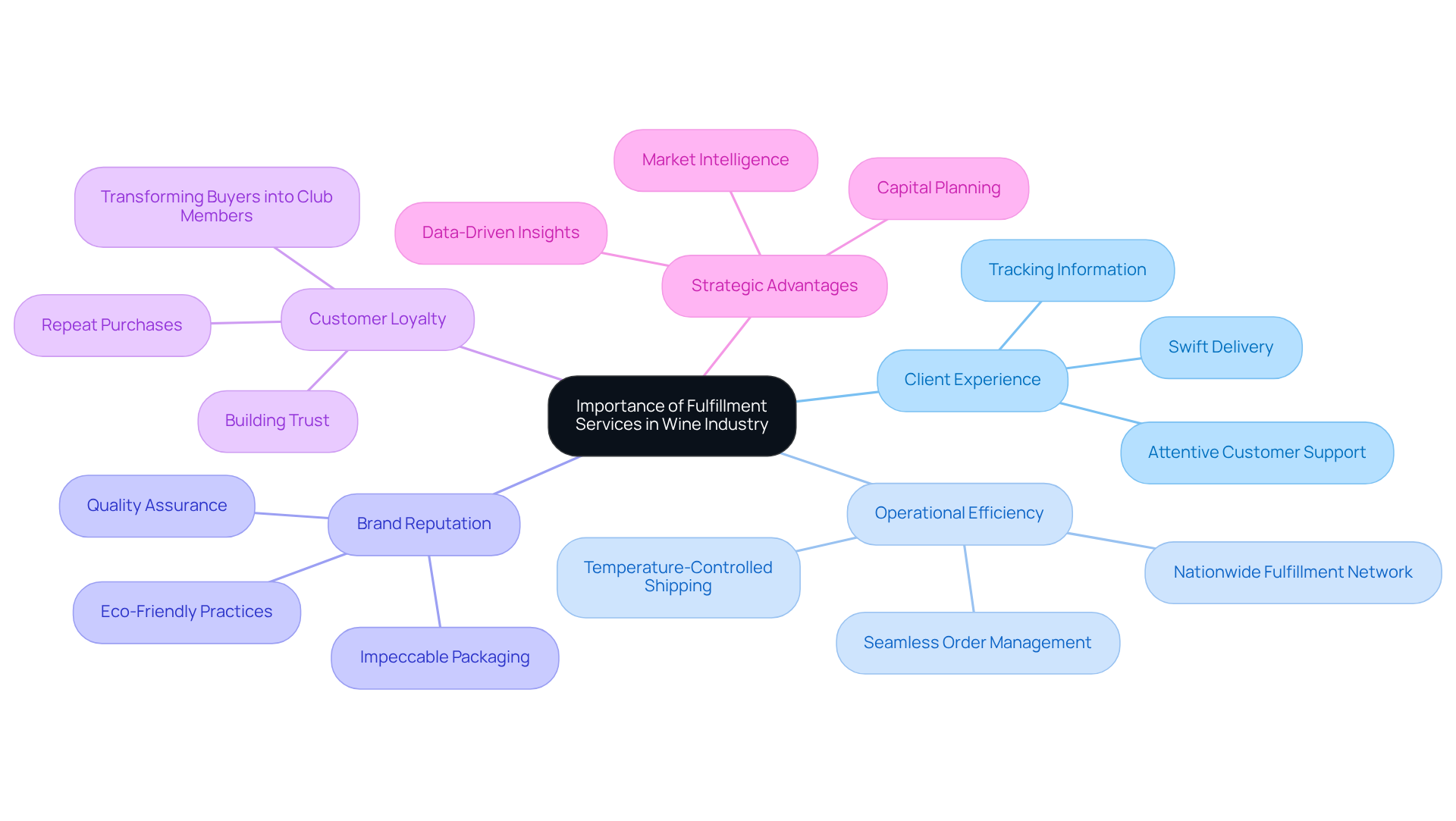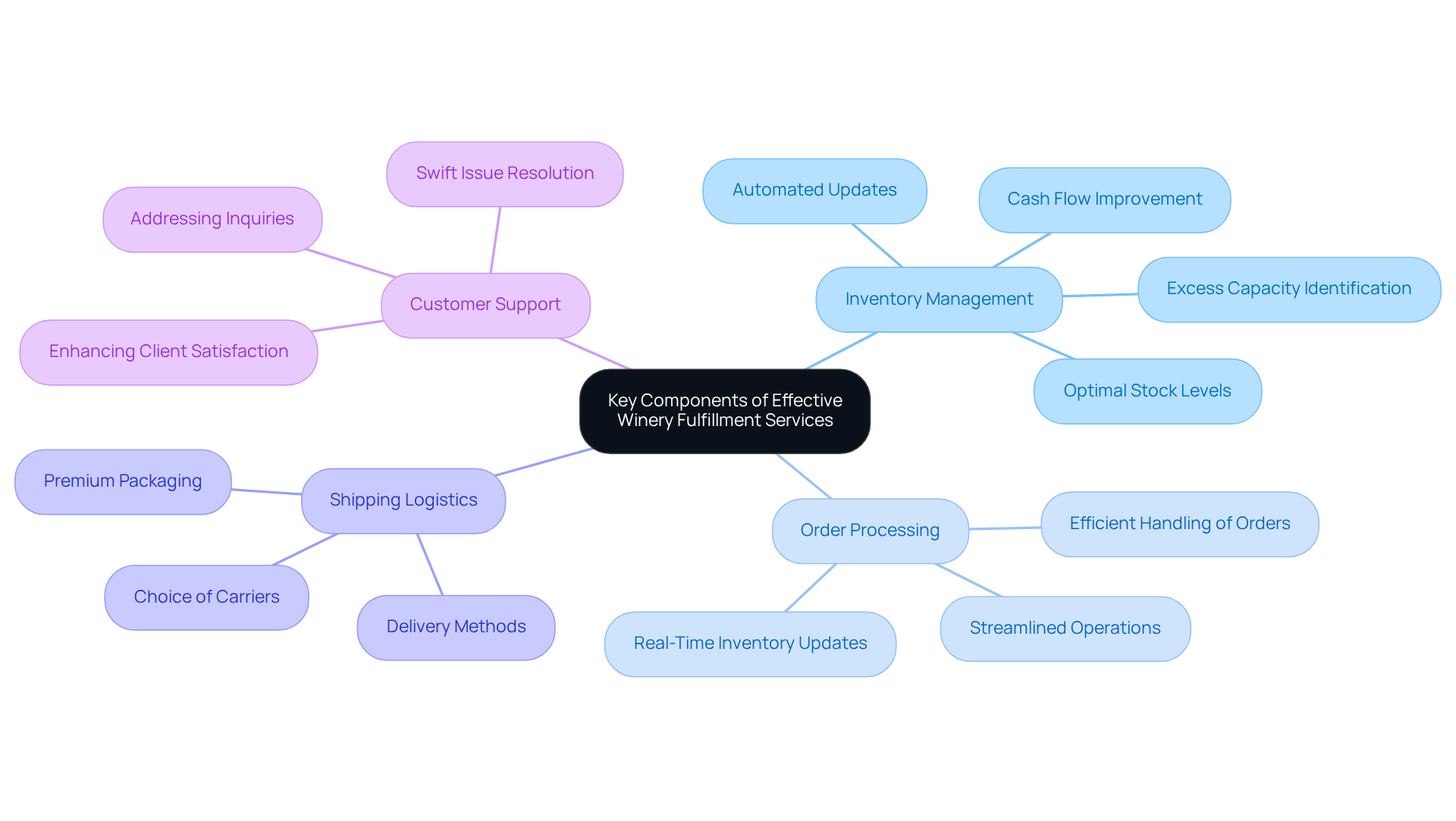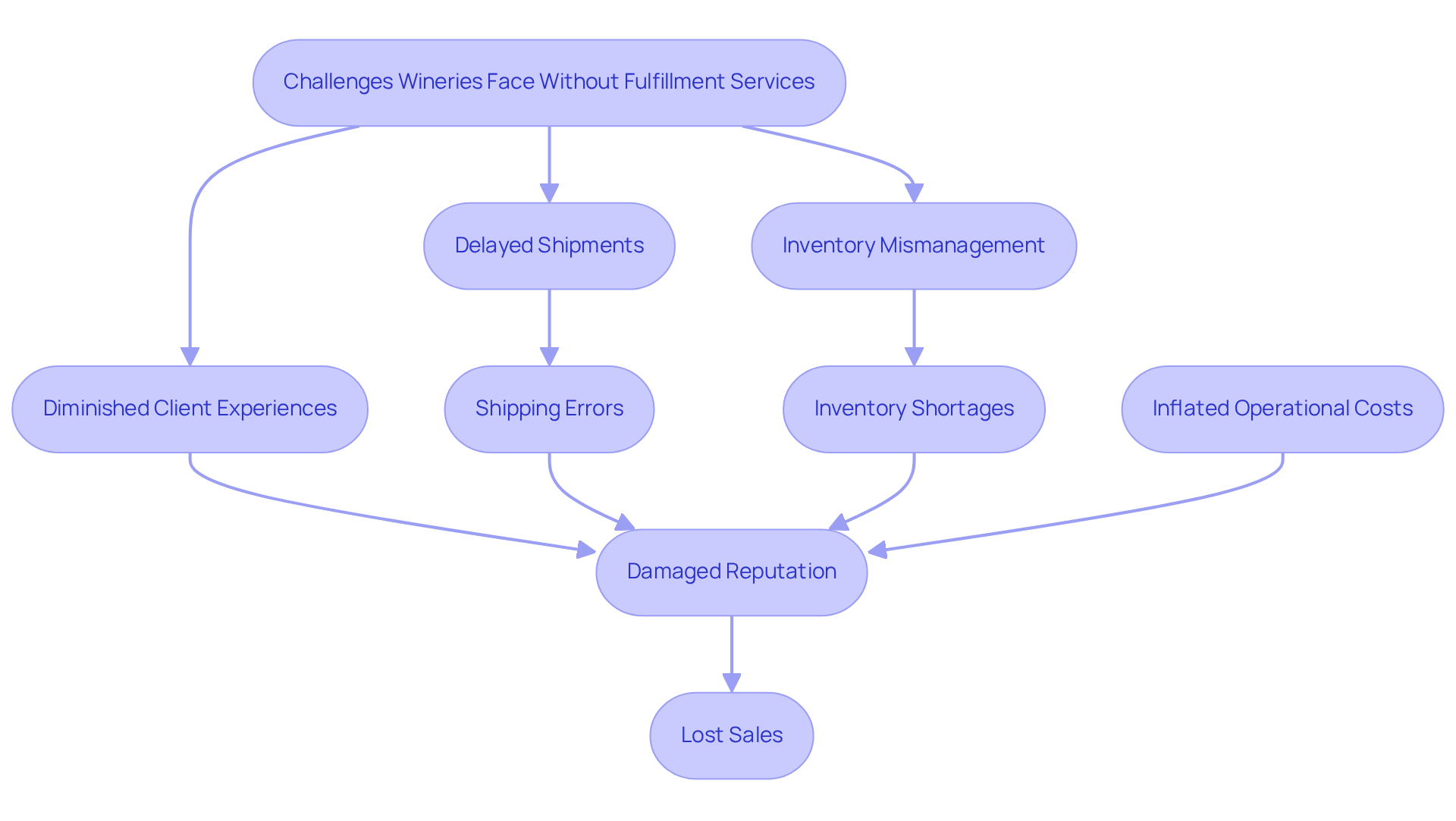Overview
Winery fulfillment services are indispensable for vineyards, as they effectively manage inventory, order processing, shipping logistics, and customer support. This comprehensive management directly influences operational efficiency and enhances customer satisfaction. Wineries that leverage these services can significantly boost their direct-to-consumer sales and foster brand loyalty.
Why? Because effective fulfillment translates to timely deliveries and improved client experiences, ultimately driving growth in a competitive market. By investing in these services, vineyards position themselves to thrive amidst industry challenges and capitalize on emerging opportunities.
Introduction
Winery fulfillment services are a critical backbone of the wine industry, empowering vineyards to adeptly navigate the complexities of storage, packaging, and delivery. As the demand for direct-to-consumer sales escalates, grasping the intricacies of these services becomes imperative for wineries seeking to elevate customer satisfaction and operational efficiency. But what occurs when these essential systems are neglected? The challenges arising from insufficient fulfillment can jeopardize not only sales but also a vineyard's reputation in an increasingly competitive landscape.
Defining Winery Fulfillment Services
Winery fulfillment services encompass the vital methods and systems that vineyards employ to manage the storage, packaging, and delivery of their products directly to customers. These winery fulfillment services are essential for ensuring that orders are processed efficiently and accurately, which enables producers to meet client expectations for timely delivery. Key components of winery fulfillment services include:
- Inventory management
- Order processing
- Shipping logistics
- Customer support
By optimizing these operations, businesses in the wine industry can significantly enhance their direct-to-consumer (DTC) sales efforts and customer satisfaction through winery fulfillment services.
The importance of effective winery fulfillment services cannot be overstated. By 2025, establishments that leverage fulfillment services will be better positioned to navigate the complexities of the market. For example, winery fulfillment services, which act as logistics centers for vineyards, play a pivotal role in reducing operational costs and environmental impact by centralizing warehousing and logistics. This allows vineyards to focus on production while winery fulfillment services ensure compliance with state regulations. Furthermore, strategic capital planning can enhance the effectiveness of winery fulfillment services, allowing vineyards to allocate resources judiciously and invest in growth opportunities.
Successful achievement strategies frequently involve a data-driven approach, which has proven to yield measurable growth in winery fulfillment services. For instance, wineries that implemented robust winery fulfillment services experienced a remarkable 153% increase in e-commerce order volume during market expansion. This underscores the direct correlation between , such as winery fulfillment services, and improved sales performance. Additionally, the capacity to manage inventory effectively and utilize winery fulfillment services to streamline order processing can lead to heightened customer retention and loyalty, transforming casual buyers into dedicated club members through well-established strategies.
As the wine sector continues to evolve, the significance of winery fulfillment services will only escalate. Wineries must adapt to shifting consumer preferences and market dynamics, making delivery an integral component of their operational strategy. By investing in winery fulfillment services and incorporating strategic financial planning, wine producers can not only enhance their sales but also forge lasting connections with their clients, ensuring long-term success in a competitive landscape.

The Importance of Fulfillment Services in the Wine Industry
Winery fulfillment services are pivotal in the wine industry, profoundly influencing client experience and operational efficiency. In an era where buyers increasingly demand swift and reliable delivery, vineyards that prioritize can set themselves apart from their competitors. Effective fulfillment not only guarantees timely deliveries but also bolsters brand reputation and fosters client loyalty—an essential aspect for family-owned vineyards aiming to thrive for generations.
For instance, establishments that offer tracking information and maintain attentive customer support cultivate trust, encouraging repeat purchases and transforming occasional buyers into committed club members. As the direct-to-consumer (DTC) market expands, partnering with a dependable winery fulfillment services provider becomes imperative for wineries looking to scale operations and attract new customers.
Notably, statistics reveal that 27% of new wine club registrations originate from online sources, underscoring the importance of seamless execution in meeting consumer expectations. Furthermore, industry experts emphasize that efficient winery fulfillment services are not merely operational necessities; they constitute strategic advantages that can drive growth and enhance brand loyalty.
By integrating strategic capital planning and engaging brand narratives into their operational frameworks, producers can effectively address challenges such as cash flow issues and the need for substantial consumer connections, positioning themselves for enduring success in this competitive arena.

Key Components of Effective Winery Fulfillment Services
Efficient vineyard delivery services hinge on several essential elements: inventory management, order processing, shipping logistics, and customer support. Effective inventory management is not just important; it is crucial for vineyards to maintain optimal stock levels, ensuring they can meet consumer demand without overextending their resources. This practice enhances cash flow by preventing excess capital from being tied up in unsold stock and aids in identifying excess capacity that can be leveraged for additional revenue.
Order processing is a pivotal component of the delivery chain, demanding efficient handling of incoming orders to guarantee both accuracy and speed. A reliable inventory management system can automate this process, providing real-time updates and streamlining operations. This efficiency is vital, as wineries that implement effective inventory management strategies can significantly enhance their winery fulfillment services.
Shipping logistics encompass the choice of carriers, suitable packaging materials, and delivery methods that align with client expectations. Premium packaging is essential for safeguarding wines during transport and improving presentation, leading to heightened satisfaction and repeat business.
Ultimately, is indispensable for addressing inquiries and resolving issues swiftly. By integrating these elements, wine producers can create a seamless delivery experience that not only enhances client satisfaction but also drives sales. Statistics indicate that wineries employing optimal inventory management methods can realize significant improvements in operational efficiency, culminating in superior delivery outcomes.

Challenges Wineries Face Without Fulfillment Services
Wineries that neglect service provisions encounter significant obstacles, including , inventory mismanagement, and diminished client experiences. The absence of a structured order completion process can result in order tracking difficulties, leading to shipping errors and inventory shortages. Such inefficiencies not only frustrate customers but also compel them to seek alternatives, potentially damaging the establishment's reputation and sales.
Moreover, inadequate logistics can inflate operational costs, eroding profitability. For family-operated vineyards striving to enhance their direct-to-consumer (DTC) sales, overlooking distribution services can severely undermine their competitive edge in an increasingly dynamic market.
Enocap's expertise in DTC strategies and market intelligence underscores the necessity of reliable delivery solutions to meet evolving consumer expectations, particularly in the face of economic pressures and shifting spending habits. To effectively address these challenges, vineyards should integrate strategic capital planning and market insights into their delivery strategy.
Ensuring customer satisfaction and loyalty is essential, and effective fulfillment services are a critical component of this strategy. Ready to transform your vineyard's growth? Schedule a complimentary 30-minute growth audit to uncover opportunities tailored to your winery's unique situation.

Conclusion
Winery fulfillment services are paramount to the success of vineyards, offering essential frameworks for the storage, packaging, and delivery of wine products directly to consumers. These services not only streamline operations but also elevate customer satisfaction, enabling wineries to meet the increasing consumer expectations for timely and reliable delivery.
The discussion emphasizes several critical facets of winery fulfillment services, such as effective inventory management, order processing, shipping logistics, and customer support. By embracing a data-driven approach and implementing strategic capital planning, wineries can markedly enhance their operational efficiency and sales performance, evidenced by significant increases in e-commerce order volume. The potential for growth and customer loyalty through robust fulfillment services is unmistakable, rendering them an indispensable element of any successful winery's strategy.
As the wine industry continues to evolve, the necessity for efficient fulfillment services will become ever more vital. Wineries that prioritize these services not only set themselves up for immediate success but also cultivate enduring relationships with their customers. Investing in winery fulfillment services transcends mere logistics; it is a strategic imperative that can drive sustained growth and confer a competitive advantage in the marketplace. By adopting these practices, vineyards can thrive in a continually changing landscape, adeptly meeting the demands of today's consumers and securing their role in the future of the industry.
Frequently Asked Questions
What are winery fulfillment services?
Winery fulfillment services are methods and systems that vineyards use to manage the storage, packaging, and delivery of their products directly to customers. They are essential for ensuring efficient and accurate order processing.
What are the key components of winery fulfillment services?
The key components of winery fulfillment services include inventory management, order processing, shipping logistics, and customer support.
Why are winery fulfillment services important?
Winery fulfillment services are important because they help vineyards meet client expectations for timely delivery, reduce operational costs, and ensure compliance with state regulations. They also enhance direct-to-consumer sales efforts and customer satisfaction.
How can winery fulfillment services impact a vineyard's performance?
By optimizing winery fulfillment services, vineyards can significantly improve their e-commerce order volume and customer retention. For example, wineries that implemented robust fulfillment services saw a 153% increase in order volume during market expansion.
What role does strategic capital planning play in winery fulfillment services?
Strategic capital planning enhances the effectiveness of winery fulfillment services by allowing vineyards to allocate resources wisely and invest in growth opportunities.
How do winery fulfillment services contribute to environmental impact?
Winery fulfillment services help reduce environmental impact by centralizing warehousing and logistics, which streamlines operations and minimizes resource use.
What is the future significance of winery fulfillment services in the wine sector?
The significance of winery fulfillment services will continue to grow as the wine sector evolves. Wineries must adapt to changing consumer preferences and market dynamics, making efficient delivery a crucial part of their operational strategy.




